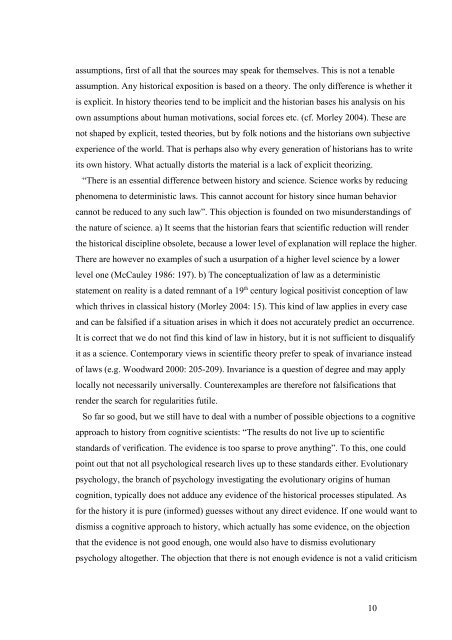The dissemination of divination in roman republican times
The dissemination of divination in roman republican times
The dissemination of divination in roman republican times
You also want an ePaper? Increase the reach of your titles
YUMPU automatically turns print PDFs into web optimized ePapers that Google loves.
assumptions, first <strong>of</strong> all that the sources may speak for themselves. This is not a tenable<br />
assumption. Any historical exposition is based on a theory. <strong>The</strong> only difference is whether it<br />
is explicit. In history theories tend to be implicit and the historian bases his analysis on his<br />
own assumptions about human motivations, social forces etc. (cf. Morley 2004). <strong>The</strong>se are<br />
not shaped by explicit, tested theories, but by folk notions and the historians own subjective<br />
experience <strong>of</strong> the world. That is perhaps also why every generation <strong>of</strong> historians has to write<br />
its own history. What actually distorts the material is a lack <strong>of</strong> explicit theoriz<strong>in</strong>g.<br />
“<strong>The</strong>re is an essential difference between history and science. Science works by reduc<strong>in</strong>g<br />
phenomena to determ<strong>in</strong>istic laws. This cannot account for history s<strong>in</strong>ce human behavior<br />
cannot be reduced to any such law”. This objection is founded on two misunderstand<strong>in</strong>gs <strong>of</strong><br />
the nature <strong>of</strong> science. a) It seems that the historian fears that scientific reduction will render<br />
the historical discipl<strong>in</strong>e obsolete, because a lower level <strong>of</strong> explanation will replace the higher.<br />
<strong>The</strong>re are however no examples <strong>of</strong> such a usurpation <strong>of</strong> a higher level science by a lower<br />
level one (McCauley 1986: 197). b) <strong>The</strong> conceptualization <strong>of</strong> law as a determ<strong>in</strong>istic<br />
statement on reality is a dated remnant <strong>of</strong> a 19 th century logical positivist conception <strong>of</strong> law<br />
which thrives <strong>in</strong> classical history (Morley 2004: 15). This k<strong>in</strong>d <strong>of</strong> law applies <strong>in</strong> every case<br />
and can be falsified if a situation arises <strong>in</strong> which it does not accurately predict an occurrence.<br />
It is correct that we do not f<strong>in</strong>d this k<strong>in</strong>d <strong>of</strong> law <strong>in</strong> history, but it is not sufficient to disqualify<br />
it as a science. Contemporary views <strong>in</strong> scientific theory prefer to speak <strong>of</strong> <strong>in</strong>variance <strong>in</strong>stead<br />
<strong>of</strong> laws (e.g. Woodward 2000: 205-209). Invariance is a question <strong>of</strong> degree and may apply<br />
locally not necessarily universally. Counterexamples are therefore not falsifications that<br />
render the search for regularities futile.<br />
So far so good, but we still have to deal with a number <strong>of</strong> possible objections to a cognitive<br />
approach to history from cognitive scientists: “<strong>The</strong> results do not live up to scientific<br />
standards <strong>of</strong> verification. <strong>The</strong> evidence is too sparse to prove anyth<strong>in</strong>g”. To this, one could<br />
po<strong>in</strong>t out that not all psychological research lives up to these standards either. Evolutionary<br />
psychology, the branch <strong>of</strong> psychology <strong>in</strong>vestigat<strong>in</strong>g the evolutionary orig<strong>in</strong>s <strong>of</strong> human<br />
cognition, typically does not adduce any evidence <strong>of</strong> the historical processes stipulated. As<br />
for the history it is pure (<strong>in</strong>formed) guesses without any direct evidence. If one would want to<br />
dismiss a cognitive approach to history, which actually has some evidence, on the objection<br />
that the evidence is not good enough, one would also have to dismiss evolutionary<br />
psychology altogether. <strong>The</strong> objection that there is not enough evidence is not a valid criticism<br />
10


